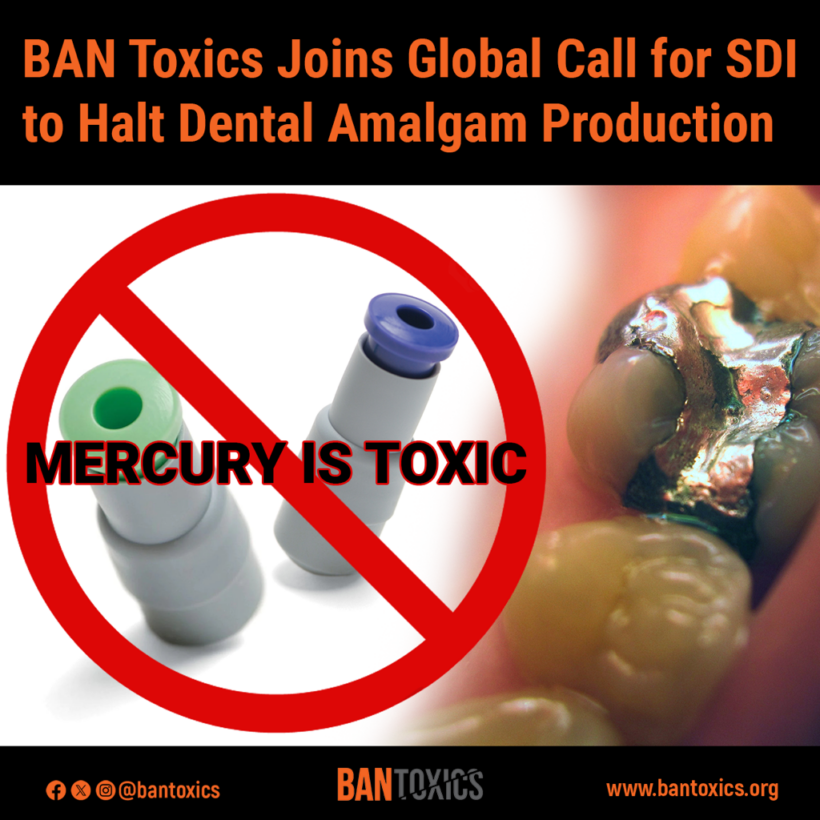Following the recent announcement by Southern Dental Industries Limited (SDI) that it will cease production of dental amalgam by 2028 or earlier, environmental NGO BAN Toxics raised concerns that the timeline set by the world’s leading manufacturer of dental amalgam is unacceptably delayed.
SDI, an Australian-based company engaged in the research, development, manufacturing, and marketing of dental products made this announcement during an investors’ conference on August 27, 2024, according to a statement by the European Network for Environmental Medicine.
The statement also included a letter from The World Alliance For Mercury-Free Dentistry, appealing to SDI to end dental amalgam production sooner.
“We find it deeply alarming that SDI will continue the production of dental amalgam until 2028. That is four more years of toxic mercury being released into the environment. BAN Toxics joins the World Alliance For Mercury-Free Dentistry, the European Network for Environmental Medicine, and other advocates in the fight to eliminate mercury worldwide, in calling the attention of SDI,” said Jam Lorenzo, BAN Toxics Deputy Executive Director.
In dentistry, amalgam is commonly used as a filling material for cavities in teeth. About half of a dental amalgam filling is liquid mercury, with the rest being a powdered mix of silver, tin, and copper. Mercury binds the alloy particles to create a strong, durable filling. However, a global effort to phase out mercury use in dentistry has gained momentum due to concerns over its environmental and health impacts.
Mercury is a highly toxic, naturally occurring heavy metal. It is a neurotoxin that can cause irreparable damage to the central and peripheral nervous system. Inhaling Mercury vapor can adversely affect the nervous, digestive, and immune systems, as well as the lungs and kidneys, and can potentially be fatal. It has long environmental persistence and global mobility—cycling through the atmosphere, ocean, and land. Its emissions and releases can bioaccumulate and biomagnify in the food chain, posing a significant threat to human health and the environment.
A study done by BAN Toxics in 2015 concluded that Mercury emissions from dental clinics and institutions “can be substantial and usually exceed general accepted human exposure limits.” Dental amalgams are the primary source of mercury exposure for individuals who have them while dental professionals are also at risk of Mercury intoxication from inhaling mercury vapors during the storage, preparation, and use of dental amalgam.
According to the UNEP Global Mercury Partnership, an estimated 30% to 40% of mercury in amalgam enters solid waste streams and accumulates in water, soil, and the atmosphere. Meanwhile, the World Alliance for Mercury-Free Dentistry states that research findings indicate about 60% of amalgam from capsules ends up directly in the waste during processing. Mercury from fillings is also emitted or released into the environment through cremation, burials, and excretion.
Based on reports and other official documents from the Minamata Convention on Mercury, 45 countries have already banned the use of dental amalgam by law. This includes the Philippines, which issued the Department of Health (DOH) Administrative Order (AO) 2020-0020, titled “Guidelines on the Phase-out of Mercury Use in Dental Restorative Procedures,” in 2020. Additionally, the Food and Drug Administration (FDA) Circular No. 2022-003 bans all mercury-added thermometers, sphygmomanometers, dental amalgam capsules, and liquid mercury for use in dental restorative purposes.
However, market monitoring conducted by BAN Toxics earlier this year revealed that some dental supply stores in Manila are still selling mercury-added dental amalgam. A quick search on the popular online platform Shopee, as of writing, also showed the availability of dental mercury from domestic sellers. According to their Shopee accounts, the sellers are based in Bacoor, Las Piñas, Cebu City, and Davao City. Additionally, a number of China-based sellers of dental amalgam can also be found.
“While there is no evidence of SDI dental amalgam products entering our country, we cannot rule out the possibility that these products may be re-labeled and sold through online platforms or enter our country illegally. Given mercury’s nature as an indestructible, persistent pollutant with global mobility, the emissions and releases from SDI’s continued production of amalgam should be considered a global concern,” Lorenzo said.
According to their website, SDI has distributors and retailers in over 100 countries throughout the world and offices and warehouses in the US, Germany, and Brazil. In the Philippines, there is only one official distributor of SDI products. BAN Toxics reached out to this distributor in October 2022 and found that they are no longer selling dental amalgam.
SDI is the last publicly traded manufacturer of dental amalgam fully transitioning to mercury-free
alternatives. Major competitors from the US, such as Dentsply Sirona and Kerr, have generally left the business. SDI’s 2023 Annual Report mentioned that they “continued to benefit from two of the main amalgam competitors leaving the category.” The same report noted that their North American sales increased by 7.3% due to this fact. SDI also reported that dental amalgam represented approximately 17.6% of their total sales, with sales rising from $15,328,000 in 2022 to $18,977,000 in 2023.
Ironically, SDI had received a $3 million grant from the Commonwealth Government in 2019 that successfully developed amalgam replacement products. In 2023, SDI became a co-financing partner of the GEF7 Project to phase down dental amalgam, contributing $4.5 million in-kind. SDI’s role in the project is to share knowledge and experience from the dental industry’s transition from manufacturing dental amalgam to alternative mercury-free dental restorative materials.
“It shouldn’t be ‘business as usual’ when it’s public health and the environment that is at stake. We urge SDI to prioritize global well-being over profit and end their production of mercury-added dental amalgam immediately,” Lorenzo said.
References:
https://environmentalmedicine.eu/sdi-promises-investors-to-cease-amalgam-production-by-2028/
https://environmentalmedicine.eu/wp-content/uploads/Final-SDI-Letter-18-August-2024.pdf
https://www.sdi.com.au/wp-content/uploads/2023/09/SDI-Limited-Annual-Report-2023.pdf
https://www.sdi.com.au/au/distributors/
https://www.sdi.com.au/wp-content/uploads/2023/09/SDI-Limited-Annual-Report-2023.pdf






